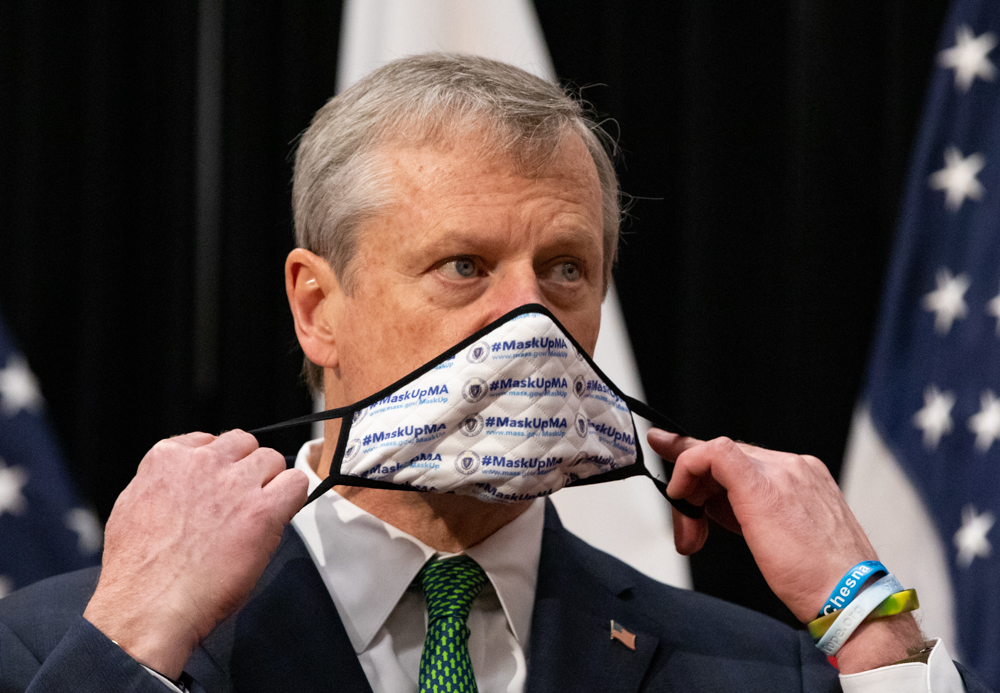Economy
Baker Blames Legislature For ARPA Spending Delays

By Michael P. Norton
Gov. Charlie Baker is among those disappointed that Beacon Hill Democrats couldn’t agree on a plan to put nearly $4 billion to work throughout the economy before breaking for a seven-week stretch of informal sessions, and is blaming a legislative decision earlier this year for causing delays.
Baker proposed spending American Rescue Plan Act funds in June, but legislative Democrats put the federal aid in a lockbox that they control and opted for a long public hearing process to gather feedback about the state’s needs. They then couldn’t agree on a consensus bill by Wednesday when formal sessions ended for 2021.
“The Baker-Polito Administration believes the Legislature’s original decision six months ago to freeze these funds and subject them to the legislative process created a massive delay in putting these taxpayer dollars to work,” Baker press secretary Terry MacCormack said. “Massachusetts was already behind most of the country in utilizing these funds before the latest setback, and further delay will only continue to leave residents, small businesses and hundreds of organizations frozen out from the support the rest of the country is now tapping into to recover from this brutal pandemic.”
Negotiations among six members of a conference committee are continuing, but any agreement they might reach in the next seven weeks will require bipartisan and unanimous support since any single lawmaker can stop a bill from advancing in informal sessions. Formal sessions are scheduled to resume on Jan. 5, but there’s uncertainty also about whether, under legislative rules, the appropriations bills will die at the start of the new annual session or carry over intact.
Baker’s reaction came more than 12 hours after lawmakers cut their last formal sessions of 2021 short once it became clear that Rep. Aaron Michlewitz and Sen. Michael Rodrigues, who are leading talks on behalf of branches that passed their bills unanimously, would not be able to reach an agreement.
While conference talks are conducted in secret, there were some signs of discord Wednesday night. When Michlewitz signaled a deal was not within reach, Rodrigues appeared taken aback and said he lacked a “dance partner” and that “it takes two to tango.” As the House abruptly adjourned at 6:25 p.m., Sen. William Brownsberger was telling senators to settle in for a lot more work that evening. Once news of the House adjournment reached the Senate, that chamber ended its session at 6:38 p.m.
Baker’s concerns about a holdup in the use of federal recovery funds are not new, and date back to June when the House rejected his plan to immediately spend $2.8 billion in federal COVID-19 relief money. The Legislature instead voted to sweep $4.89 billion into a COVID-19 relief fund. At that time, the governor’s office worried about the potential for “a process that would take years while the communities that were hit hardest by the pandemic, including communities of color, wait.”
While there’s widespread agreement on the need to put ARPA funds to work as soon as possible, generally speaking, the funds must be committed by the end of 2024 and spent by the end of 2026.
The amounts differ and both bills feature scores of project earmarks, but both the House (in October) and Senate (last week) have passed plans to spend about $3.82 billion from a combination of ARPA funds and surplus state tax dollars from fiscal 2021 to stimulate the economy, support workers and businesses, and invest in infrastructure projects, public health and other priorities.
The Senate bill proposes to spend $250.9 million on public health infrastructure, which is $100 million more than the House. It would also increase investments in water and sewer infrastructure by $75 million over the $100 million in the House bill and boost mental health spending by $150 million, to $400 million.
Meanwhile, the House proposed $40 million for youth summer and school-year jobs, $75 million for capital projects on public college and university campuses, and $20 million for special education. The Senate proposal funds none of those priorities.
The other members of the conference committee are Reps. Dan Hunt (D-Dorchester) and Todd Smola (R-Warren), and Sens. Cindy Friedman (D-Arlington) and Patrick O’Connor (R-Weymouth).
Baker has an open press appearance at 10 a.m. Thursday at the Greater Boston Food Bank, 70 South Bay Ave.







MitzySkritzy
November 18, 2021 at 1:17 pm
Plans must first be made on the amount that will be stolen and who will receive stolen monies that they are entitled too. All federal ARPA monies should be equally divided to those Americans who have an at least 10 year work history and pay taxes. This idea takes all of the politics out of the decision and helps heal massive political division in America. You are welcome all of you Mongroloids!